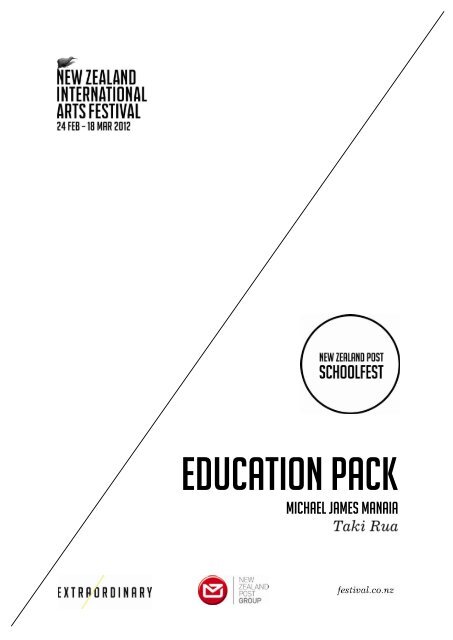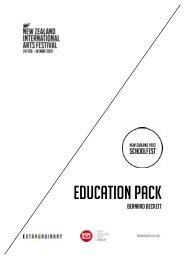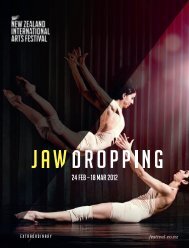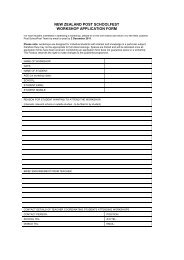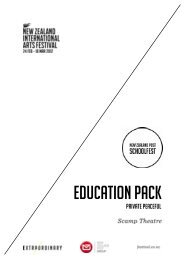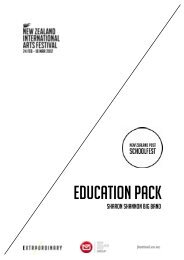Michael James Manaia - New Zealand International Arts Festival ...
Michael James Manaia - New Zealand International Arts Festival ...
Michael James Manaia - New Zealand International Arts Festival ...
- No tags were found...
You also want an ePaper? Increase the reach of your titles
YUMPU automatically turns print PDFs into web optimized ePapers that Google loves.
EDUCATION PACK<br />
<strong>Michael</strong> <strong>James</strong> manaia
FOR STUDENTS<br />
Kia ora and welcome to SchoolFest 101.<br />
This is your guide to getting the most out of your <strong>Festival</strong> experience.<br />
A live theatre performance can be really exciting. Everyone involved in the production – the cast and crew – work<br />
very hard to give a great performance. It's also the job of the audience to help the performers give their best. One<br />
way you can do this is by practicing the rules of theatre etiquette and by being generally considerate to others<br />
around you.<br />
Here are some etiquette tips:<br />
Get there on time. To avoid being late, plan to arrive 30 minutes early. If you're late, you<br />
might not be allowed into the show.<br />
It's always a good idea to visit the restroom before the performance begins! It isn't always<br />
easy to leave during a show.<br />
Pay attention to any announcements that are made before the performance about the<br />
rules of the theatre you're attending, and the location of the fire exits.<br />
Don't take pictures during the performance. It can be very distracting to the performers<br />
and could cause a mishap. The design of the show is also the intellectual property of the<br />
producers. They don't want to see their property splashed over the internet!<br />
Turn off your cell phone. Other than the noise & disruption it could make, it can interfere<br />
with the sound system in the auditorium – even on silent. Please make sure it is<br />
completely turned off.<br />
Be considerate to those around you. Don't eat or talk during the performance ...<br />
whispering is still speaking, so please limit this to emergencies only! If you need to unwrap<br />
cough lozenges, try to do it during applause, or loud musical numbers.<br />
Keep your feet on the floor, not on the seat or balcony in front of you. If you must leave<br />
during a performance, wait for an appropriate break in the show or exit during intermission.<br />
Do applaud when the performance is over. This tells the performers and crew that you<br />
appreciate their work. Stand and applaud if you really thought the show was great. Some<br />
audiences will shout out ‘Bravo' (for male) or ‘Brava' (for female) if they think a<br />
performance was outstanding. You can also applaud and laugh at appropriate times<br />
during the performance.<br />
Now that you know what the etiquette is you can enjoy the show!
FOR TEACHERS<br />
We love having students at the <strong>New</strong> <strong>Zealand</strong> <strong>International</strong> <strong>Arts</strong> <strong>Festival</strong>. These students, especially younger<br />
ones, often have a visceral, unmediated response to performances that performers love to see, and rarely do<br />
from more hardened theatre-goers. But going to the theatre has its own set of etiquette and protocols. It's part of<br />
the whole experience and when adhered to, everyone benefits.<br />
Please ensure that your students are well briefed in theatre etiquette. Here are some tips...<br />
Discuss theatre etiquette with your students<br />
Spend some time talking with your students about what they can expect and what is expected of them. Get them<br />
to brainstorm what they think good theatre etiquette looks like<br />
Here are some guidelines to get you started.<br />
Dress Code<br />
For the <strong>New</strong> <strong>Zealand</strong> <strong>International</strong> <strong>Arts</strong> <strong>Festival</strong> schools' performances there is no set dress code - tidy school<br />
uniform or mufti is fine. For the Schools to <strong>Festival</strong> shows (where students attend public evening shows) students<br />
may be seated amongst people who have been looking forward to a swanky night on the town, so again tidy<br />
school uniforms or mufti is fine, but encourage students to wear the nicer clothes in their repertoire.<br />
Dress Rehearsals<br />
Three of the Schools' Performances (Peter & the Wolf, Hōhepa & Stravinsky: Oedipus Rex/Symphony of Psalms)<br />
are Dress Rehearsals. This means that the shows may be stopped at any time and taken back to an earlier point<br />
in the performance after the director/conductor addresses the cast/crew. Although this is rare, it does happen,<br />
and it's part of the show. If anything, students are required to be MORE considerate and attentive during this<br />
process. You could encourage your students to see it as a unique learning opportunity; what was the<br />
director/conductor unhappy with How did the performers respond Did they get it right the next time<br />
Cell phones<br />
A cell phone ringing or beeping is distracting for performers and audience members. We need your help to make<br />
sure this isn't an issue. Please remind your students to turn their cell phones off - not to silent, off! Please be a<br />
good role model and turn yours off too.<br />
Get there early and keep together<br />
Doors generally open 30 minutes before the show starts. Allow plenty of travel time to the theatre. Once at the<br />
theatre, stick together and make sure students know where they're sitting. Ushers are only too happy to point you<br />
in the right direction.<br />
Preparation and research<br />
Your students are more likely to get something out of the experience, and be attentive and responsive, if they<br />
know some of the context behind the performance. Talk with your class and encourage them to research the<br />
show, the company, and the director. The more they know the more they'll understand and enjoy the work. We<br />
will have links and resources up on the <strong>New</strong> <strong>Zealand</strong> Post SchoolFest section site from 30 January 2012.<br />
Most of all, remind them to enjoy it!<br />
Despite all the etiquette guidelines, as well as a learning opportunity, live performance is also about having fun<br />
and seeing something different. Remind your students to enjoy the experience and have fun!<br />
Please don’t hesitate to contact us with any questions. We’re here to help.
Contents<br />
About Taki Rua<br />
Cast & Creatives – <strong>Michael</strong> <strong>James</strong> <strong>Manaia</strong><br />
About <strong>Michael</strong> <strong>James</strong> <strong>Manaia</strong><br />
o Synopsis<br />
o Directors Note<br />
Making of <strong>Michael</strong> <strong>James</strong> <strong>Manaia</strong><br />
History of <strong>Michael</strong> <strong>James</strong> <strong>Manaia</strong><br />
Activities/Discussion ideas<br />
Resources/further reading<br />
<strong>New</strong> <strong>Zealand</strong> <strong>International</strong> <strong>Arts</strong> <strong>Festival</strong>
About Taki Rua<br />
OUR VISION<br />
‘Connecting Our Heritage – Past, Present & Future’<br />
‘Topa ana te kaeaea, ōna whatu tau ana ki te ukaipo, te kōpūnga, te uri whakatupu’<br />
OUR MISSION<br />
‘Ensuring the foundation for Māori voices to be heard worldwide’<br />
OUR STORY<br />
For 27 years Taki Rua has been an arts industry leader – a creative rule breaker, unpredictable and<br />
unconventional, challenging and evolving the definition of Māori theatre. We exist to connect our<br />
heritage, past and present and ensure the foundation for Māori voices to be heard worldwide.<br />
Stemming from a traditional culture and adapting to a multicultural world, Taki Rua is a call to our<br />
audiences and artists to celebrate and share stories from our own back yard that define and<br />
challenge the essence and perceptions of who we are as the indigenous culture of Aotearoa.<br />
Our challenge is to voice the questions of our past that remain unanswered in our present; we<br />
celebrate these voices as a taonga. We are the conspiracy of our ancestors and our work ensures<br />
their voices are still heard today. We acknowledge our foundations are the achievements of those<br />
who have gone before us.<br />
Our objective is for Māori voices to be celebrated and proudly owned by all people of Aotearoa. We<br />
want to inspire and encourage the next generation of <strong>New</strong> <strong>Zealand</strong>er’s to fall in love with their<br />
culture through the medium of theatre. The invitation is to know who we are; by investigating our<br />
collective past and recognising our history and future are not black and white. We extend this<br />
invitation to our artists, our audiences, our people<br />
Four Strands<br />
Te Reo Māori (Community)<br />
‘Unique in Aotearoa’<br />
Taki Rua Productions annually tours works in Te Reo Māori for schools, marae and community<br />
centres throughout the country promoting the holistic use of Te Reo within theatre for audiences<br />
and practitioners.<br />
<strong>New</strong> <strong>Zealand</strong> <strong>International</strong> <strong>Arts</strong> <strong>Festival</strong>
Te Wai Paapaku (Development)<br />
‘Bridging emerging artists with experienced professionals’<br />
Envisioning and developing new, <strong>New</strong> <strong>Zealand</strong> work by encouraging new voices in Māori and English<br />
while providing professional development for the next generation of theatre practitioners.<br />
Te Wai Hōhonu (Main Stage)<br />
‘Raising expectations and setting new levels of achievement’<br />
Ensuring Māori theatre has a high profile presence nationwide and is accessible to wider <strong>New</strong><br />
<strong>Zealand</strong> audiences.<br />
Te Wai Rangimārie (<strong>International</strong> Presentation & Relationship)<br />
‘Securing involvement within the global theatre community’<br />
Promoting our company and successful works to international opportunities and securing off shore<br />
and local production commitment.<br />
Te Reo - Schools Tour<br />
For the past 15 years Taki Rua Productions has annually toured works in Te Reo Māori for schools,<br />
marae and community centres throughout Aotearoa/ <strong>New</strong> <strong>Zealand</strong>. Taki Rua Productions has a<br />
commitment to communities, children and promoting access to Māori theatre to help all <strong>New</strong><br />
<strong>Zealand</strong>ers feel comfortable in taking ownership of Te Reo Māori, an official language of <strong>New</strong><br />
<strong>Zealand</strong>.<br />
Taki Rua makes professional theatre available to rural and urban communities encouraging<br />
engagement and participation in the arts while increasing audience awareness and exposure to<br />
Māori language and tikanga. Enabling communities to experience Māori theatre in their own<br />
backyard, the annual tour has been highly successful throughout its 15-year history and continues to<br />
build upon its audience numbers.<br />
This is the only 100% Te Reo Māori annual tour and is an exciting opportunity for tamariki to<br />
experience quality theatre. It further promotes the holistic use of Te Reo Māori within theatre for<br />
audiences and practitioners. By taking Māori theatre to Kura kaupapa and small communities we<br />
aim to engage rangatahi and we endorse the use of te reo Māori i ngā wā katoa, i ngā wāhi katoa.<br />
<strong>New</strong> <strong>Zealand</strong> <strong>International</strong> <strong>Arts</strong> <strong>Festival</strong>
Cast & Creatives<br />
John Broughton – Playwright - Ngati Kahungunu Ki Heretaunga, Ngai Tahu<br />
ED BSc (Massey) BDS PhD PGDipCOMDENT Dip Grad (Otago)<br />
John is an Associate Professor at the University of Otago with the Dunedin School<br />
of Medicine and the Faculty of Dentistry. He spent 17 years in the <strong>New</strong> <strong>Zealand</strong><br />
Territorial Army progressing through the ranks to be a commissioned officer. He<br />
was recently received the <strong>New</strong> <strong>Zealand</strong> Defence Services medal. He has written<br />
numerous plays which have been performed throughout <strong>New</strong> <strong>Zealand</strong> and<br />
overseas. In 1990 he was awarded the Dominion Sunday Times Bruce Mason<br />
Award.<br />
Nathaniel Lees - Director<br />
Nathaniel has been an actor and director for almost 30 years. In this time he has<br />
acted in many productions both here in Aotearoa and internationally. As an award<br />
winning director, he has directed productions throughout Aotearoa and the<br />
Pacific. His work in the film and television industry is well documented, from<br />
numerous NZ television series and productions to blockbusters such as The Matrix<br />
Trilogy and 30 Days of Night. Nathaniel currently works as an acting tutor at Toi<br />
Whakaari: NZ Drama School.<br />
Maaka McGregor - Sound Designer/Musician - Ngati Raukawa<br />
Maaka McGregor is a multi instrumentalist, producer and audio engineer. He had<br />
his first formal drum lesson with drumming legend Roger Sellers in 1987 and has<br />
since spent his life playing and recording for more than 50 bands nationally and<br />
internationally.He started his career at Te upoko o te ika in 1986 and has a lifetime<br />
of experience in commercial production, live sound, radio, film and television<br />
broadcasting. Some of the more well know NZL bands and artists he has worked<br />
with are Moana and the Moa Hunters, Electric Wire Hustle, South Side of Bombay,<br />
Holly Smith, Dam Native, Recloose, Hinewehi Mohi, Fat Freddies Drop, Upper<br />
Hutt Posse, Nathan Haines and Scribe. Maaka is best known internationally for<br />
his work with the ground breaking Māori electronica band ' WAI'.<br />
Lisa Maule - Lighting Designer<br />
Lisa Maule is based in Wellington and has worked as a lighting designer on<br />
many productions with notable producers of <strong>New</strong> <strong>Zealand</strong> work including<br />
Taki Rua Productions, Downstage Theatre, Circa Theatre, Armstrong<br />
Productions and STAB (BATS Theatre). She has received substantial critical<br />
acclaim for her work including Chapman Tripp Lighting Design of the Year<br />
1998, 2000, 2008.<br />
Lisa has 20 years experience in the performing arts sector and is a Senior Tutor<br />
in the Technology and Management programmes at Toi Whakaari: <strong>New</strong><br />
<strong>Zealand</strong> Drama School.<br />
"Lighting, you could say 'illuminates' the collective vision and is a natural<br />
partner with sound to help an audience journey through the performance.<br />
<strong>New</strong> <strong>Zealand</strong> <strong>International</strong> <strong>Arts</strong> <strong>Festival</strong>
Collaboration is at the heart of performing arts process and I enjoy each team I<br />
work with and each new project."<br />
Daniel Williams - Set/Costume/Props Designer<br />
Daniel graduated from the Performance Design Degree taught jointly by<br />
Massey University and Toi Whakaari: NZ Drama School in 2006. His<br />
theatre career has seen Daniel design Sets and Costumes for Samuel<br />
Beckett's EndGame, Please Don't Feed the Models, Angels in America and<br />
A Streetcar Named Desire. He was nominated Weta Workshop Set<br />
designer of the Year at the 2007 Chapman Tripp Awards and then won the<br />
following year in 2008 for his work on The Little Dog Laughed. The past two years saw Daniel work<br />
in Theatre and Film in Edinburgh, Amsterdam, Prague and London, since returning to <strong>New</strong> <strong>Zealand</strong><br />
he has worked on Long Cloud<br />
Youth Theatre's Dutch season. Most recently he designed the set for The 39 Steps<br />
at Centrepoint Theatre.<br />
Te Kohe Tuhaka – Performer - Ngati Porou<br />
Graduate of Toi Whakaari: NZ Drama School. Te Kohe has worked extensively as an<br />
actor and presenter in theatre, film and television. Recent film and television<br />
highlights include Billy, What Really Happened at Waitangi, Go Girls and Eruption.<br />
Stage credits include Silo Theatre’s acclaimed production of The Brother Size, Maui:<br />
One Man Against the Gods and the award winning Paua by SEEyD Theatre.<br />
Synopsis<br />
A unique and poignant story about a <strong>New</strong> <strong>Zealand</strong> man who, after returning<br />
from the Vietnam war, finds himself at odds with his culture, his history and<br />
his memories. Packed full of dynamic theatrical action and colourful<br />
characters, we follow one man's journey through childhood, family, love,<br />
grief, violence, conflict and passion.<br />
For further reading, see paper:<br />
<strong>Michael</strong> <strong>James</strong> <strong>Manaia</strong>: the personal is political.<br />
Written by Christina Stachurski<br />
Published in JNZL: Journal of <strong>New</strong> <strong>Zealand</strong> Literature<br />
Directors Note<br />
Image::Philip Merry<br />
To provide insight and an alternative perspective to a societal issue is one of the foundation<br />
elements of theatre.<br />
<strong>Michael</strong> <strong>James</strong> <strong>Manaia</strong> is the story of a man who has committed a tragic act, and his struggle to<br />
come to terms and understand the reasons for this act.<br />
The fact that he is a Māori and is born and raised in that cultural environment only adds to his<br />
confusion of identity when placed in the societal shifting of values in the early 1970’s in <strong>New</strong> <strong>Zealand</strong><br />
and the global aspirations of the United States during the Vietnam War.<br />
<strong>New</strong> <strong>Zealand</strong> <strong>International</strong> <strong>Arts</strong> <strong>Festival</strong>
We as an audience become witnesses to this man’s struggle to get a handhold on reasons for his<br />
actions as he relives and is flooded by memories and images of his life – from his close relationship<br />
with his younger brother in rural <strong>New</strong> <strong>Zealand</strong> through to the horrific images, memories and<br />
consequences of his role in the Vietnam War.<br />
To witness is to be involved, and to be involved is to begin to understand.<br />
To begin to understand is to begin to take responsibility.<br />
I want to acknowledge the work of all who have gone before in the creation of <strong>Michael</strong> <strong>James</strong><br />
<strong>Manaia</strong>, and thank all involved in this production as we strive to understand and thus share the<br />
responsibilities of our society.<br />
He aha te mea nui o te ao<br />
He tangata! He tangata! He tangata!<br />
Nathaniel Lees<br />
Making of <strong>Michael</strong> <strong>James</strong> <strong>Manaia</strong><br />
To create <strong>Michael</strong> <strong>James</strong> <strong>Manaia</strong> Taki Rua had to first select the creative team to best realise the<br />
work, team members needed to connect with the content and style of the piece as well as<br />
understanding the purpose of bringing this work back to the stages of <strong>New</strong> <strong>Zealand</strong>. Once selected,<br />
the creative team embarked on a collaborative making process of workshops and rehearsals led by<br />
Director, Nathaniel Lees. In late 2011 the whole creative team, director, set designer, sound<br />
designer, lighting designer and performer all came together for a two week development workshop.<br />
The purpose of the workshop was to give the team time to explore the script, its themes, images,<br />
music and characters in order to identify the future direction the piece would take. The workshop<br />
period was also an opportunity for performer, Te Kohe Tuhaka to familiarize himself with the role of<br />
<strong>Michael</strong> <strong>James</strong>, his ability to know and carry the role is essential to the success of this work as it is a<br />
solo show.<br />
After the initial development workshop, the creative team then entered a 5 week full time rehearsal<br />
period leading up to the festival premiere. The creative team worked collaboratively to bring all their<br />
ideas to life throughout the rehearsal process. Each member is responsible for generating ideas and<br />
leading their area of expertise, ideas are then brainstormed collectively and decisions made towards<br />
the finished work. For Te Kohe, the focus was on bringing <strong>Michael</strong> <strong>James</strong> to life, refining the<br />
character and how he communicates the story with the audience; this involves physical, vocal and<br />
emotional rigor and training, fine tuned by the director. By the last week of rehearsal all elements of<br />
the production are finalised and the finished work is ready for public presentation.<br />
<strong>New</strong> <strong>Zealand</strong> <strong>International</strong> <strong>Arts</strong> <strong>Festival</strong>
History of <strong>Michael</strong> <strong>James</strong> <strong>Manaia</strong><br />
History<br />
First performed at Downstage in 1991, <strong>Michael</strong> <strong>James</strong> <strong>Manaia</strong> has received much critical acclaim,<br />
completing performance seasons throughout <strong>New</strong> <strong>Zealand</strong> and abroad. This story is as relevant<br />
today as when first performed and speaks not only to our identity and history as <strong>New</strong> <strong>Zealand</strong>ers but<br />
also to the ongoing and widespread issues associated with the war that affects much of the world<br />
we live in. This work has the potential to initiate valuable dialogue and awareness around questions<br />
of war and manhood, doing so through a rich and dynamic performance experience.<br />
The first workshop of <strong>Michael</strong> <strong>James</strong> <strong>Manaia</strong>, facilitated by Playmarket, was held at Tapu Te Ranga<br />
Marae in Island Bay, Wellington, 24-24 October 1990.<br />
<strong>Michael</strong> <strong>James</strong> <strong>Manaia</strong> opened on 15 February 1991 at Downstage Theatre, Wellington. <strong>Manaia</strong> was<br />
played by Jim Moriarty, and Colin McColl directed.<br />
This production then went on to open at:<br />
The Trustbank Theatre, Dunedin on 5 April 1991 for <strong>New</strong> <strong>Zealand</strong> Writers week<br />
The Traverse Theatre, Edinburgh, Scotland on 13 August 1991 for the Edinburgh <strong>Festival</strong><br />
Watershed Theatre, Auckland on 24 November 1991<br />
The National Library Theatre, Wellington on 21 March 1992 for the <strong>New</strong> <strong>Zealand</strong> <strong>Festival</strong> of<br />
the <strong>Arts</strong><br />
<strong>Michael</strong> <strong>James</strong> <strong>Manaia</strong> is presented by arrangement with Playmarket<br />
<strong>New</strong> <strong>Zealand</strong> <strong>International</strong> <strong>Arts</strong> <strong>Festival</strong>
ACTIVITIES/DISCUSSION IDEAS<br />
Ideas for discussion<br />
What made this a <strong>New</strong> <strong>Zealand</strong> play<br />
What were some of the struggles that <strong>Michael</strong> <strong>James</strong> was dealing with in the play<br />
How was Māori culture/ language expressed/ used within in the play<br />
Why do you think this story should be told today<br />
What didn’t you understand in the play and why<br />
How did the performer use his voice and body to create different moods/ characters<br />
within the story<br />
How successful was the performer in keeping the audience engaged throughout the<br />
performance<br />
What did and didn’t you like about the play and why<br />
What kind of play is it What are the themes<br />
How does <strong>Michael</strong> <strong>James</strong> change during the course of the play<br />
o<br />
o<br />
How would you describe him at the beginning<br />
How would you describe him at the end<br />
How did the production elements of lighting/sound/costume/music create a mood<br />
in the play What did they do<br />
Can you find any reviews of the show Do you agree with them Why/why not<br />
<strong>New</strong> <strong>Zealand</strong> <strong>International</strong> <strong>Arts</strong> <strong>Festival</strong>
ACTIVITIES<br />
Explore creating three different characters using only physicality to show their differences,<br />
consider age, vocal quality, pace (i.e. are they fast talkers, mumblers, slow movers etc). Play<br />
with pushing each character to extremes to see how different they can appear.<br />
Choose an environment, e.g. bush, city, beach, and identify some of the key sounds and<br />
rhythms that we associate with these environments. Use instruments or found objects to<br />
recreate one of these environments using only sound.<br />
Write a 400 word review of this play, describe the story, themes and production elements<br />
that stood out for you, tell us how these affected you, what was successful and what was<br />
not.<br />
Find three songs by musicians that you know that capture something of the mood of this<br />
play and explain why and how this is true.<br />
Resources & further reading<br />
http://www.playmarket.org.nz/playwrights/john-broughton<br />
http://www.takirua.co.nz/<br />
The Free Library:<br />
http://www.thefreelibrary.com/<strong>Michael</strong>+<strong>James</strong>+<strong>Manaia</strong>%3A+the+personal+is+political.-<br />
a0204543896<br />
<strong>Michael</strong> <strong>James</strong> <strong>Manaia</strong> by <strong>James</strong> Broughton<br />
Published by University of Otago, Dunedin, 1994<br />
<strong>New</strong> <strong>Zealand</strong> <strong>International</strong> <strong>Arts</strong> <strong>Festival</strong>


